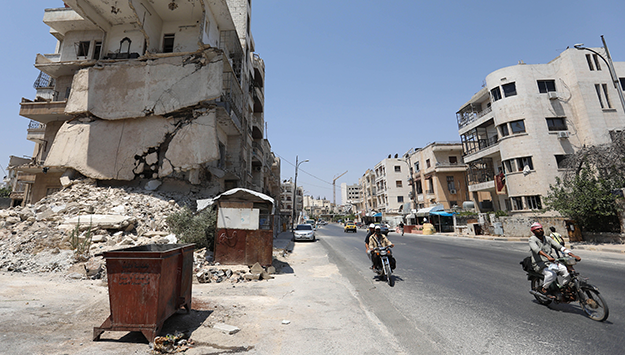Read the full article at War on the Rocks.
As the Assad regime completes its conquest of southwestern Syria, attention is shifting to the country’s northwest and in particular to the province of Idlib, the last remaining bastion of opposition control. To many people’s great concern, the question of Idlib’s future has more recently turned to when the regime and its Iranian and Russian backers will attack, rather than whether they will do so.
An estimated 2.5 to 3.3 million people – at least 1.2 million of whom are internally displaced – are currently crammed into this largely rural region, which only constitutes 3 to 4 percent of Syria. Before 2011, Idlib was home to no more than 750,000 inhabitants. Syria’s northwest, long a hotbed of armed resistance and the heartland of al-Qaeda-linked operations, has become a real-life dumping ground for defeated opposition fighters and their families from elsewhere in the country. At least 70,000 armed men are currently in Idlib and its surrounding areas, according to one estimate, a sizable minority of whom belong to groups formerly or still linked to al-Qaeda. Should the regime unleash what would inevitably be a brutal military campaign upon Idlib, it would be civilians who would suffer immeasurably – and in larger numbers than ever before.
Having already taken in more than 3.5 million Syrian refugees since 2011, Turkey has firmly shut its border to any more people seeking to flee, so the prospect of conflict in Idlib is truly a nightmare scenario. All other events in Syria would look like drops in the ocean. And yet the United States, the European Union, and their allies in the region appear entirely disinterested.
Turkey has declared Idlib a “red line” and seems intent on enforcing it, though it remains unclear if that will be enough to stop a regime campaign. Russia, meanwhile, insists it is opposed to any escalation in hostilities in Idlib, but similarly, evidence of its capacity to truly restrain the Assad regime and Iran is limited at best.
The United States, Europe and their allies should urgently recognize the importance of sustaining the relative calm that currently prevails in northwestern Syria to avoid the array of challenges and threats that would result from a major escalation in fighting. Diplomacy is at the core of the solution. Idlib may look complicated and chaotic, but there is some order to that chaos – particularly because of Turkey’s risk-laden investment in asserting control over northwestern Syria’s various opposition actors. Russia’s dedication to continued de-escalation should be tested and reinforced. If there was ever a time to “work with the Russians,” it is now. Should hostilities be allowed to resume, the resulting havoc will be unprecedented in seven years of war and the consequences will be felt far and wide.
Photo: OMAR HAJ KADOUR/AFP/Getty Images



